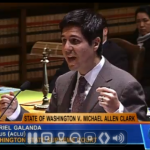In a horrid opinion in Mashantucket Pequot v. Town of Ledyard, the Second Circuit scrutinized IGRA's tax preemption provision, 25 U.S.C. 2710(d)(4), which provides:
nothing in this section shall be interpreted as conferring upon a State or any of its political subdivisions authority to impose any tax, fee, charge, or other assessment upon an Indian tribe or upon any other person or entity authorized by an Indian tribe to engage in a class III activity.
Astonishingly, the Second Circuit held that this provision somehow does not operate to outlaw state taxes on Class III slot machine vendors, meaning on "entit[ies] authorized by an Indian tribe to engage in a class III activity." The panel reasoned that “IGRA does not directly preempt, by its text of by plain implication. . . . IGRA addresses state taxation, without prohibiting taxes." Wow.
Indeed, in the way of judicial realism, the Second Circuit overlooked contrary interpretations of 2710(d)(4) by its sister circuits. Consider, for example, what panels in Cabazon II (9th Cir. 1994) and Rincon (9th Cir. 2010), have said about that statute over the last two decades:
Cabazon II: “IGRA preempts the State of California from taxing offtrack betting activities on tribal lands.” Rincon: “[N]othing in IGRA can reasonably be construed as conferring on states the power to impose anything [fees or taxes]; all the states are empowered to do is negotiate.” Id.: “Under 2710(d)(4), it is not only ‘taxes’ that are precluded, it is any ‘tax, fee, charge, or other assessment.’”
We've now arguably got a circuit split. Until that--heaven forbid--might ever be resolved on high, gaming tribes in the West should be protected from the state tax man under cover of Cabazon II and Rincon. Those mega-gaming tribes in the Northeast, maybe not so much.
Gabriel "Gabe" Galanda is a partner at Galanda Broadman PLLC, of Seattle, an American Indian owned law firm. He is an enrolled member of the Round Valley Indian Tribes of Covelo, California. Gabe assists tribal governments and businesses in all matters of tribal economic development and diversification, including entity formation and related tax strategy. He also helps tribes and tribal businesses and joint ventures withstand attack from federal, state and local government. Gabe can be reached at 206.691.3631 or gabe@galandabroadman.com.








